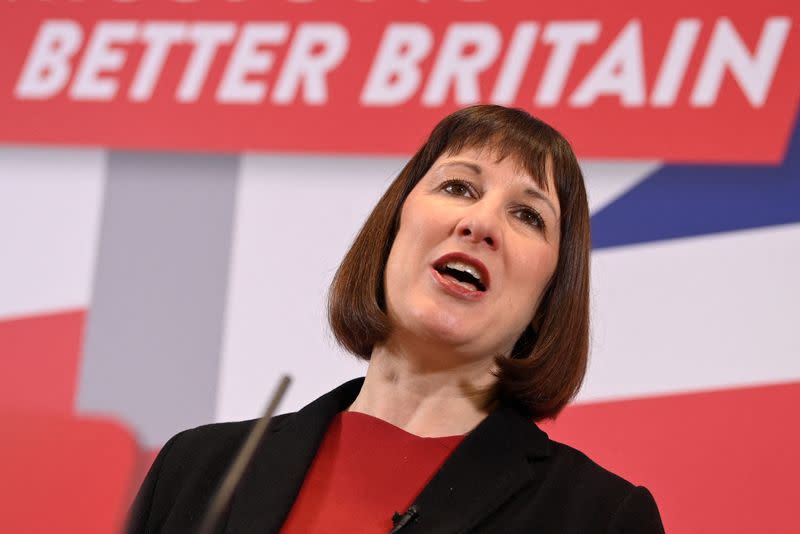UK's Labour attacks planned pension changes as giveaway to the rich
By Kate Holton and David Milliken
LONDON (Reuters) -Britain's opposition Labour Party vowed on Thursday to reverse the government's planned pension changes, saying they were a giveaway to the top 1% of pension savers at a time when many households are being hit by tax increases and high inflation.
Finance minister Jeremy Hunt surprised his Conservative Party by announcing in a budget statement on Wednesday that he would no longer impose tax penalties on lifetime pension savings which exceed 1 million pounds ($1.2 million).
Hunt said the reform was part of his bid to keep more older people in work and address a shortage of workers in Britain.
The Labour Party, which is well ahead of the Conservatives in opinion polls before an election that is expected in 2024, said the move was the "the wrong priority, at the wrong time, for the wrong people".
Labour said the policy would mean that people with more than 1.4 million pounds in their pension pot would pay a total of around 150,000 pounds less in tax, at a time when basic rate taxpayers are facing higher tax bills.
"The budget was a chance for the government to unlock Britain's promise and potential," Rachel Reeves, Labour's would-be finance minister, said. "But the only surprise was a 1 billion-pound pensions bung for the 1%, a move that will widen the cost-of-living chasm."
Hunt defended the changes, saying their cost was dwarfed by 94 billion pounds worth of government support for households to soften the surge in the cost of living.
He added that the pensions changes were urgently needed to address a shortage of doctors. Some long-serving senior doctors have cut back their hours or retired early as they near the lifetime pension limit, adding to strains in the National Health Service (NHS).
"I don't think it is the wrong values to support our NHS," Hunt told BBC radio when asked about criticisms that the government was helping higher earners.
"If you're asking what will have an impact on ordinary families up and down the country, it is getting their NHS operation done more quickly. And this is the simplest and quickest way to resolve that issue."
Labour said it would provide a more targeted scheme for doctors.
REGRESSIVE AND WASTEFUL
The Resolution Foundation, a think-tank which focuses on issues facing low- and middle-income households, described the tax change to discourage early retirement as hugely regressive and wasteful.
It said raising the annual tax-free pension contribution allowance to 60,000 pounds from 40,000 pounds, combined with the scrapping of the lifetime allowance, would cost the government 1.2 billion pounds.
The Resolution Foundation also said it could lead to an increase in employment of 15,000 – but at a cost of around 80,000 pounds per extra worker.
Even that employment gain could be overstated as the support could "actually encourage some people to retire earlier than they otherwise would have done", the think tank said.
The Institute for Fiscal Studies (IFS), another think tank, said it viewed official forecasts of the employment gain from the measure as optimistic, and said the government should have tightened rules which allow pension savings to be passed on to heirs free of inheritance tax.
"The lack of any coherent strategy here remains deeply disappointing," IFS director Paul Johnson said.
Plans to expand state-funded childcare to families with children under the age of three were also not certain to give a big boost to the number of workers and would mostly benefit parents who were already in work, the IFS said.
But they would lead to the government paying for over 80% of formal childcare for pre-school children in England, up from close to zero in 2000, the think tank added.
"This is a major expansion of the welfare state," Johnson said.
The focus on tax support for the wealthiest had echoes of the criticism that met the "mini-budget" of former Prime Minister Liz Truss and her finance minister Kwasi Kwarteng in September. They were later forced to reverse their plan to scrap the top rate of income tax for Britain's highest earners.
(Reporting by Kate Holton and David MillikenEditing by William Schomberg, Toby Chopra and Christina Fincher)

 Yahoo Finance
Yahoo Finance 

